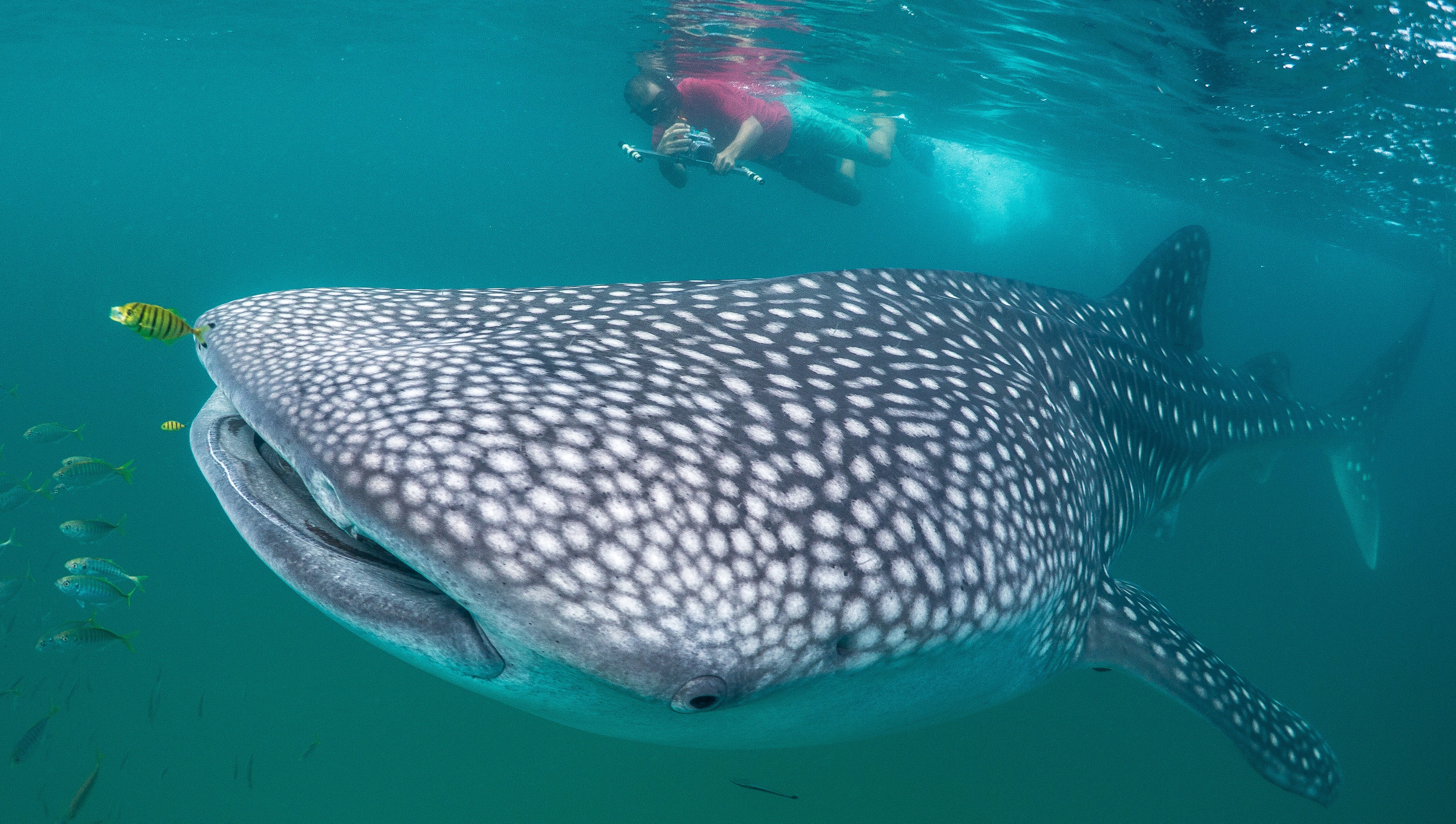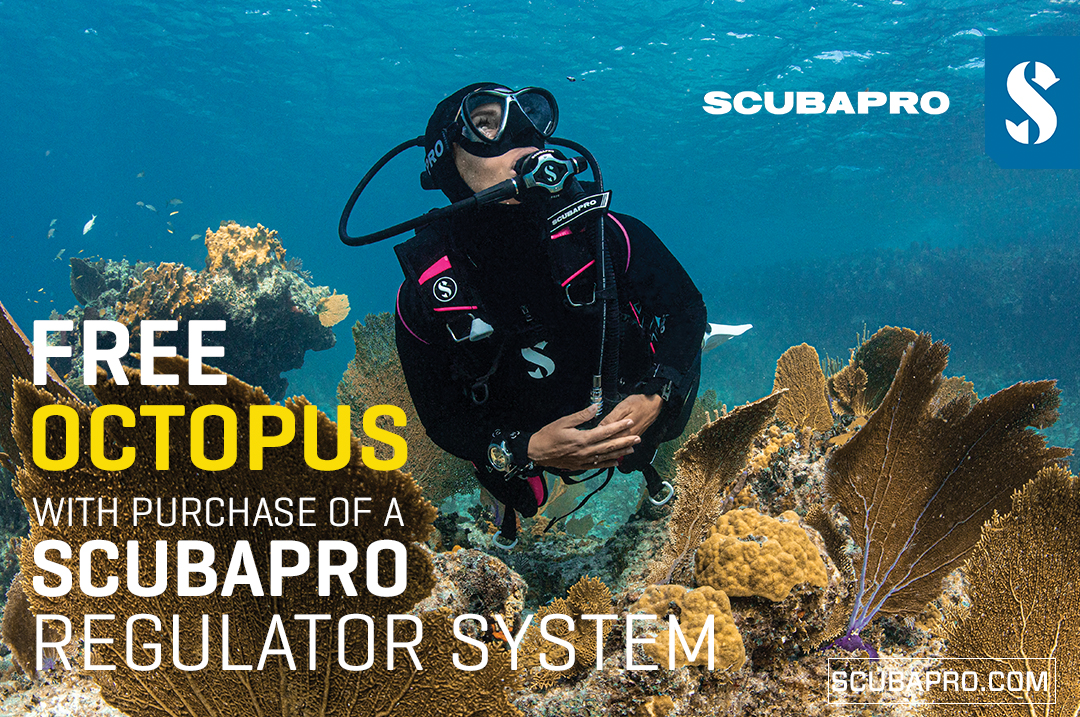News
New Scientific Report from the Marine Megafauna Foundation: Sharks and Lasers

Laser photogrammetry determines whale shark size segregation and life-history parameters to improve conservation management of the world’s largest fish
The whale shark (Rhincodon typus) is the world’s largest fish. Due to their large size, their tendency to spend a lot of time at the surface and predictable aggregating behaviour in known coastal areas, they are vulnerable to human threats such as directed fisheries, boat strikes and net entanglement. They are globally threatened, but a lack of biological and demographic information prevents an accurate assessment of their vulnerability to further decline or capacity to recover. Determining life-history parameters is therefore crucial to improving whale shark management.
The Marine Megafauna team used paired-laser photogrammetry to describe the size ranges of sharks, assess the length at which males reach sexual maturity and examine whether this technique can detect growth rates over a one to three year period, at two coastal aggregation sites in the Western Indian Ocean; Tofo Beach in southern Mozambique and Mafia Island in Tanzania.
The findings highlight that the size range and sex ratio of whale sharks from Mozambique and Tanzania are similar to those at most other coastal aggregation sites globally, in that mostly male juvenile sharks are present. The size at maturity was ~200 cm longer than for whale sharks in the Atlantic, suggesting biological differences among sharks in the two oceans. Growth rates could not be determined because the slow growth of the sharks in combination with the accuracy of photogrammetry means that a longer time interval is needed. The population segregation by size and sex observed here and elsewhere reinforces the need to determine the whereabouts of newborn sharks, immature female sharks, and mature sharks of both sexes to improve conservation and management for this globally threatened species.
“The segregation by size and sex in whale sharks is intriguing – where are we going to find the newborns, females and mature sharks in the Indian Ocean?”
Laser photogrammetry improves size and demographic estimates for whale sharks
Christoph A. Rohner1,2*, Anthony J. Richardson2,3, Clare E. M. Prebble1, Andrea D. Marshall1,4, Michael B. Bennett5, Scarla J. Weeks6, Geremy Cliff7,8, Sabine P. Winter7,8 and Simon J. Pierce1,4
1 Marine Megafauna Foundation, Praia do Tofo, Inhambane, Mozambique
2 CSIRO Oceans and Atmosphere Flagship, Brisbane Queensland 4102, Australia
3 Centre for Applications in Natural Resource Mathematics (CARM), School of Mathematics and Physics, The University of Queensland, St Lucia Queensland 4072, Australia
4 Wild Me, Praia do Tofo, Inhambane, Mozambique
5 School of Biomedical Sciences, The University of Queensland, St Lucia Queensland 4072, Australia
6 Biophysical Oceanography Group, School of Geography, Planning and Environmental Management, The University of Queensland, St Lucia Queensland 4072, Australia
7 KwaZulu-Natal Sharks Board, Umhlanga 4320, South Africa
8 Biomedical Resource Unit, University of KwaZulu-Natal, Durban 4000, South Africa
Abstract
Whale sharks Rhincodon typus are globally threatened, but a lack of biological and demographic information hampers an accurate assessment of their vulnerability to further decline or capacity to recover. We used laser photogrammetry at two aggregation sites to obtain more accurate size estimates of free-swimming whale sharks compared to visual estimates, allowing improved estimates of biological parameters. Individual whale sharks ranged from 432–917 cm total length (TL) (mean ± SD = 673 ± 118.8 cm, N = 122) in southern Mozambique and from 420–990 cm TL (mean ± SD = 641 ± 133 cm, N = 46) in Tanzania. By combining measurements of stranded individuals with photogrammetry measurements of free-swimming sharks, we calculated length at 50% maturity for males in Mozambique at 916 cm TL. Repeat measurements of individual whale sharks measured over periods from 347–1068 days yielded implausible growth rates, suggesting that the growth increment over this period was not large enough to be detected using laser photogrammetry, and that the method is best applied to estimating growth rates over longer (decadal) time periods. The sex ratio of both populations was biased towards males (74% in Mozambique, 89% in Tanzania), the majority of which were immature (98% in Mozambique, 94% in Tanzania). The population structure for these two aggregations was similar to most other documented whale shark aggregations around the world. Information on small (<400 cm) whale sharks, mature individuals, and females in this region is lacking, but necessary to inform conservation initiatives for this globally threatened species.
For information on this publication please email chris@marinemegafauna.org.
News
Dive Worldwide Announces Bite-Back as its Charity of the Year

Over the next 12 months, specialist scuba holiday company Dive Worldwide will be supporting Bite-Back Shark & Marine Conservation with donations collected from client bookings to any one of its stunning dive destinations around the world. The independently-owned operator expects to raise £3000 for the UK charity.
Manager at Dive Worldwide, Phil North, said: “We’re especially excited to work with Bite-Back and support its intelligent, creative and results-driven campaigns to end the UK trade in shark products and prompt a change in attitudes to the ocean’s most maligned inhabitant.”
Bite-Back is running campaigns to hold the media to account on the way it reports shark news along with a brand new nationwide education programme. Last year the charity was credited for spearheading a UK ban on the import and export of shark fins.
Campaign director at Bite-Back, Graham Buckingham, said: “We’re enormously grateful to Dive Worldwide for choosing to support Bite-Back. The company’s commitment to conservation helps set it apart from other tour operators and we’re certain its clients admire and respect that policy. For us, the affiliation is huge and helps us look to the future with confidence we can deliver against key conservation programmes.”
To launch the fundraising initiative, Phil North presented Graham Buckingham with a cheque for £1,000.
Visit Dive Worldwide to discover its diverse range of international scuba adventures and visit Bite-Back to learn more about the charity’s campaigns.
MORE INFORMATION
Call Graham Buckingham on 07810 454 266 or email graham@bite-back.com
Gear News
Scubapro Free Octopus Promotion 2024

Free Octopus with every purchase of a SCUBAPRO regulator system
Just in time for the spring season, divers can save money with the FREE OCTOPUS SPRING PROMOTION! Until July 31st SCUBAPRO offers an Octopus for free
with every purchase of a regulator system!
Get a free S270 OCTOPUS with purchase of these combinations:
MK25 EVO or MK19 EVO with A700
MK25 EVO or MK19 EVO with S620Ti
MK25 EVO or MK19 EVO with D420
MK25 EVO Din mit S620Ti-X
Get a free R105 OCTOPUS with purchase of the following combinations:
MK25 EVO or MK19 EVO with G260
MK25 EVO or MK17 EVO with S600
SCUBAPRO offers a 30-year first owner warranty on all regulators, with a revision period of two years or 100 dives. All SCUBAPRO regulators are of course certified according to the new European test standard EN250-2014.
Available at participating SCUBAPRO dealers. Promotion may not be available in all regions. Find an authorized SCUBAPRO Dealer at scubapro.com.
More information available on www.scubapro.com.
-

 News3 months ago
News3 months agoHone your underwater photography skills with Alphamarine Photography at Red Sea Diving Safari in March
-

 News3 months ago
News3 months agoCapturing Critters in Lembeh Underwater Photography Workshop 2024: Event Roundup
-

 Marine Life & Conservation Blogs3 months ago
Marine Life & Conservation Blogs3 months agoCreature Feature: Swell Sharks
-

 Blogs2 months ago
Blogs2 months agoMurex Resorts: Passport to Paradise!
-

 Blogs2 months ago
Blogs2 months agoDiver Discovering Whale Skeletons Beneath Ice Judged World’s Best Underwater Photograph
-

 Gear Reviews2 weeks ago
Gear Reviews2 weeks agoGEAR REVIEW – Revolutionising Diving Comfort: The Sharkskin T2 Chillproof Suit
-

 Gear Reviews3 months ago
Gear Reviews3 months agoGear Review: Oceanic+ Dive Housing for iPhone
-

 Marine Life & Conservation2 months ago
Marine Life & Conservation2 months agoSave the Manatee Club launches brand new webcams at Silver Springs State Park, Florida




